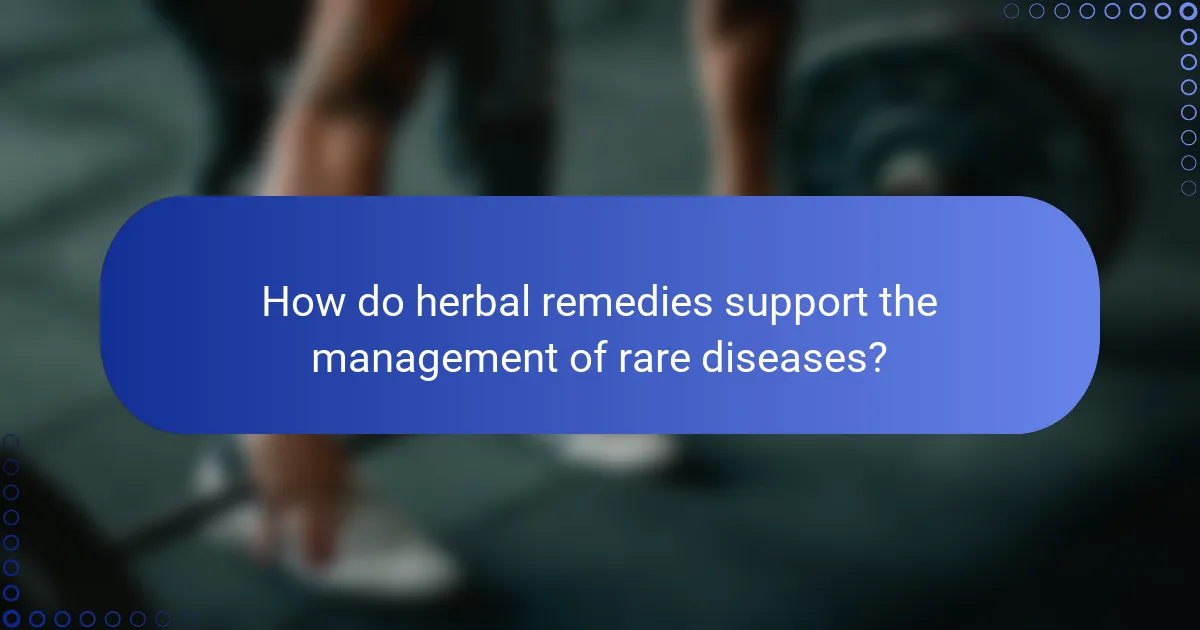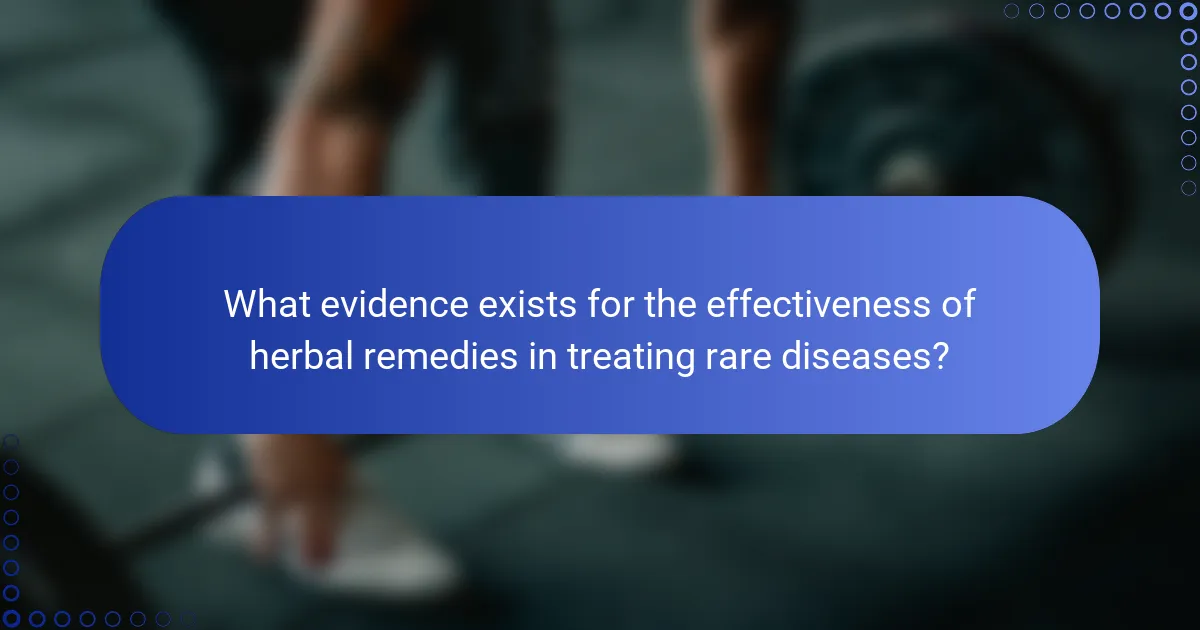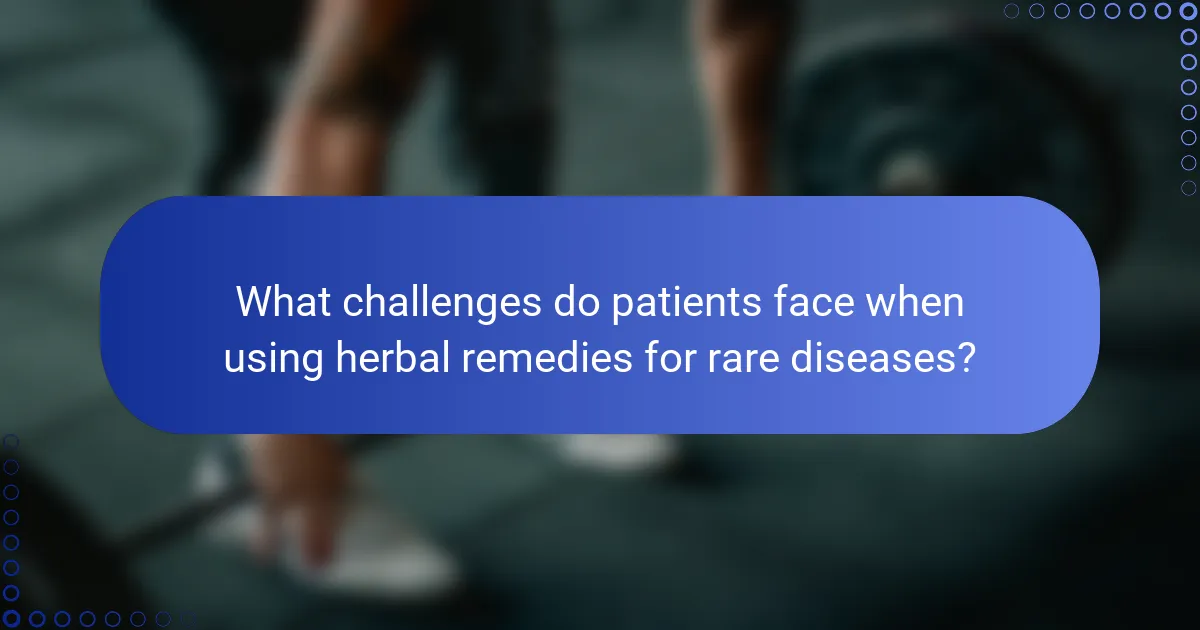Herbal remedies can provide significant support for managing rare diseases, offering symptom relief and improved quality of life. Patient testimonials highlight the positive outcomes associated with these treatments. Effectiveness comparisons reveal that herbal solutions may complement traditional medications, presenting fewer side effects. Unique herbs, such as turmeric and ashwagandha, show promise in addressing specific symptoms and conditions.

How do herbal remedies support the management of rare diseases?
Herbal remedies can effectively support the management of rare diseases by providing symptom relief and enhancing overall well-being. Many patients report positive outcomes, highlighting improved quality of life and reduced reliance on conventional medications.
Studies indicate that herbal treatments, such as turmeric and ashwagandha, show potential in managing inflammation and stress, common in rare disease patients. Patient testimonials often emphasize the holistic benefits of these remedies, including better mood and energy levels.
Effectiveness comparisons reveal that herbal remedies may complement traditional treatments, offering a unique approach to symptom management. For instance, herbal solutions can provide rare attributes like fewer side effects compared to pharmaceuticals, making them appealing for long-term use.
In summary, the integration of herbal remedies into the management of rare diseases can enhance patient experiences and outcomes, supported by both anecdotal evidence and emerging research.
What are the most common herbal remedies used for rare diseases?
Herbal remedies for rare diseases include a variety of plants known for their therapeutic properties. Common examples are ashwagandha for stress relief, turmeric for inflammation, and ginkgo biloba for cognitive support. Patient testimonials often highlight significant improvements in quality of life, while effectiveness comparisons suggest varying results based on individual conditions. The unique attributes of these remedies can enhance treatment plans, providing alternative options when conventional medicine falls short.
How do herbal remedies compare to conventional treatments for rare diseases?
Herbal remedies can offer unique benefits for rare diseases, but their effectiveness compared to conventional treatments varies widely. Patient testimonials often highlight positive experiences with herbal approaches, while scientific studies show mixed results.
Herbal remedies may provide symptom relief and improve quality of life for some patients. However, conventional treatments typically have more extensive research backing their efficacy and safety profiles.
Comparative effectiveness depends on the specific rare disease and individual patient responses. Some patients may prefer herbal options for their holistic nature, while others rely on conventional treatments for their established protocols.
In conclusion, both approaches have merits, and patient choice plays a significant role in treatment decisions for rare diseases.

What evidence exists for the effectiveness of herbal remedies in treating rare diseases?
Herbal remedies show promise in treating rare diseases, supported by patient testimonials and comparative studies. Evidence indicates that certain herbs can alleviate symptoms or improve quality of life for patients with unique conditions. For example, herbal treatments like turmeric have demonstrated anti-inflammatory properties beneficial for rare autoimmune disorders. Additionally, patient testimonials often highlight personal success stories, reinforcing the perceived effectiveness of these remedies. However, rigorous scientific comparisons remain limited, necessitating further research to establish definitive effectiveness across diverse rare diseases.
Which studies highlight the success of herbal remedies for specific rare diseases?
Several studies demonstrate the success of herbal remedies for rare diseases. For instance, a clinical trial found that curcumin significantly reduced symptoms in patients with rare inflammatory conditions. Another study highlighted the efficacy of ashwagandha in managing rare stress-related disorders, showing improved patient outcomes. Additionally, research on ginseng indicated its potential benefits for rare neurological diseases, with patient testimonials supporting these findings. These studies suggest that herbal remedies can offer effective alternatives for managing specific rare diseases.
How do patient testimonials reflect the effectiveness of herbal remedies?
Patient testimonials often demonstrate the effectiveness of herbal remedies for rare diseases. Many patients report significant improvements in symptoms after using specific herbal treatments. These testimonials provide real-world evidence, enhancing the credibility of herbal remedies.
For instance, individuals with rare autoimmune disorders have shared experiences of reduced inflammation and increased energy levels after incorporating herbal supplements. Such feedback highlights the potential benefits of these remedies, especially when conventional treatments may fall short.
Moreover, testimonials can guide future users in selecting effective herbal options, contributing to a growing body of anecdotal evidence. This collective knowledge can influence perceptions of herbal remedies in the medical community.
Overall, patient testimonials serve as a valuable resource, reflecting both the effectiveness and personal experiences associated with herbal remedies for rare diseases.

What challenges do patients face when using herbal remedies for rare diseases?
Patients using herbal remedies for rare diseases face several challenges. Limited scientific evidence often makes it difficult to assess effectiveness. Additionally, patients may encounter issues with quality control, as herbal products can vary widely in potency. Accessibility can also be a problem, with some remedies being hard to find or expensive. Furthermore, the lack of standardized dosing guidelines complicates safe usage, leading to potential adverse effects. Lastly, patients might experience skepticism from healthcare providers, which can hinder open discussions about treatment options.
How do regulatory differences impact the use of herbal remedies across regions?
Regulatory differences significantly influence the availability and acceptance of herbal remedies across regions. In regions with stringent regulations, herbal remedies may undergo extensive testing, ensuring safety and efficacy. Conversely, in areas with lax regulations, untested products may flood the market, leading to varying patient experiences and testimonials. Effectiveness comparisons often highlight these disparities, as patients in regulated environments report more consistent outcomes. Additionally, unique attributes of specific herbal remedies may be recognized and endorsed in some jurisdictions, while others may overlook their potential benefits.
What are the potential side effects and interactions of herbal remedies?
Herbal remedies can cause side effects and interactions, varying by individual and specific herbs. Common side effects include gastrointestinal issues, allergic reactions, and drowsiness. Interactions with prescription medications can lead to reduced efficacy or increased toxicity. For example, St. John’s Wort may decrease the effectiveness of certain antidepressants. Always consult a healthcare professional before using herbal remedies, especially for rare diseases.

Which unique herbs are noted for their efficacy in specific rare diseases?
Unique herbs noted for their efficacy in specific rare diseases include Ashwagandha for adrenal insufficiency and Cat’s Claw for autoimmune disorders. Other examples are Ginkgo Biloba for vascular dementia and Milk Thistle for liver diseases. These herbs have shown positive patient testimonials supporting their effectiveness.
What rare attributes of certain herbs contribute to their effectiveness?
Certain rare herbs possess unique attributes that enhance their effectiveness in treating rare diseases. For instance, the rare alkaloids in plants like Madagascar periwinkle can significantly improve outcomes in specific cancers. Additionally, some herbs contain uncommon flavonoids that exhibit anti-inflammatory properties, aiding in conditions like rare autoimmune disorders. These unique compounds differentiate these herbs from more common remedies, contributing to their specialized therapeutic benefits.

How can patients safely incorporate herbal remedies into their treatment plans?
Patients can safely incorporate herbal remedies by consulting healthcare providers and researching evidence-based practices. Integrating herbal options requires careful consideration of potential interactions with conventional treatments. Patient testimonials often highlight the effectiveness of specific herbs for managing symptoms of rare diseases. For instance, turmeric and ginger have shown promise in reducing inflammation. Comparisons of herbal remedies indicate that some may offer unique benefits, such as enhanced immunity or improved digestive health. Always monitor for side effects and adjust dosages accordingly for safe use.
What best practices should patients follow when choosing herbal remedies?
Patients should prioritize safety, efficacy, and professional advice when choosing herbal remedies. First, consult healthcare providers to ensure compatibility with existing treatments. Second, research the specific herbal remedy, focusing on documented effectiveness for the rare disease in question. Third, consider patient testimonials for insights into real-world outcomes. Finally, verify the quality and source of the herbal product, as this can significantly impact its effectiveness.
What common mistakes should be avoided when using herbal remedies?
Avoiding common mistakes is crucial for effective use of herbal remedies for rare diseases. First, do not rely solely on herbal remedies without consulting healthcare professionals. Misunderstanding dosage can lead to ineffective treatment or adverse effects. Additionally, neglecting to research potential interactions with prescribed medications is a frequent error. Patient testimonials can vary widely; therefore, evaluate them critically rather than taking them at face value. Lastly, be cautious of overestimating the effectiveness of herbal remedies compared to conventional treatments, as scientific evidence may be limited.